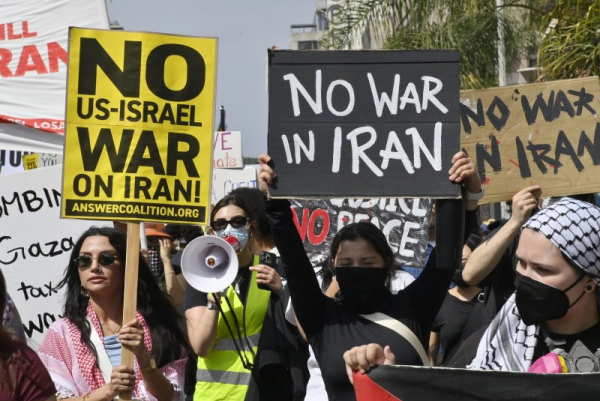Israel, Iran and the last crusade for peace
Cease-fire gives both nations a chance to regroup, rearm and reconsider what comes next.


Protesters march against U.S. involvement in the Israel-Iran war in downtown Los Angeles earlier this month. After this past weekend’s strike by U.S. Air Force B-2 bombers and Navy Tomahawk missiles on Iran’s Fordow, Isfahan and Natanz nuclear facilities, a fragile cease-fire has been put into place between the two nations. Photo by Jim Ruymen/UPI | License Photo
Last weekend’s strike by U.S. Air Force B-2 bombers and Navy Tomahawk missiles on Iran’s Fordow, Isfahan and Natanz nuclear facilities has brokered a cease-fire between Iran and Israel.
That this cease-fire is fragile is an extreme understatement. The reason is that the two most fundamental casus belli — Iran’s intent to destroy Israel and the future of its nuclear ambitions — have not been addressed yet.
No matter how one views the president, that there is even a patina of a lasting cease-fire present is a remarkable achievement even though its half life may be hours or days.
And Donald Trump’s brusque assessment that both Israel and Iran do “not know what the [expletive] they are doing” may be reversed. Both may know exactly what they are doing.
The cease-fire gives both belligerents a chance to regroup, rearm and reconsider what comes next.
For Iran, that leadership knows better than anyone how much or how little damage was done and whether or not the president’s claims that its nuclear facilities have been obliterated are accurate. Preliminary satellite photographs show that a number of trucks arrived and left Fordow before the attacks. This suggests that fissile material and even some centrifuges may have been removed and are safely stored elsewhere.
One important question is whether or not Iran or Israel is better off with and profits more from the cease-fire than the other. While Prime Minister Benjamin Netanyahu can claim victory should the cease-fire last, he is stuck with the war in Gaza. Regardless of the rationale for retaliating for the heinous October 7th Hamas attacks that killed over 1,200 Israelis, Netanyahu’s campaign is destroying Gaza as a viable place to live. That will become an issue again.
The Israeli public no longer needs to fear missile and drone attacks at least for as long as the cease-fire lasts. This is the first time probably since 1948 when the public was at such danger from attack. This is, at least, a relief.
Iran can regroup and reconsider its options. It can reconstitute its military and its chain of command. It cannot rebuild its air defenses that were destroyed, certainly for the short-term. And it cannot replenish in sufficient numbers its stocks of long-range ballistic missiles and drones that were either fired against Israel or destroyed in the air or on the ground. Reports that Iran could seek a nuclear weapon from Russia or North Korea are pure rumor and exceedingly unlikely.
So what’s next? Can the Gordian knot-like problems of Iran recognizing Israel and abandoning its plea for annihilating that country and forgoing much or all of its nuclear industries, especially those for peaceful purposes, be resolved?
If they cannot, then the life expectancy of the cease-fire is at great risk. And the wars in Gaza and Ukraine still are ongoing.
President Trump can call for negotiations between Israel and Iran, sustaining the cease-fire while these take place. But time is critical. It is unclear how long both belligerents will restrain themselves while a broader peace agreement is negotiated. One possibility is that they will not and hostilities could resume if one side sees an advantage in breaking the cease-fire.
Regardless of outcomes that will determine the consequences of the cease-fire, for the moment, this is an unprecedented moment. However, the euphoria of the seemingly success of the U.S. attack can be clouding objectivity. Enthusiasm may not be justified. And given Trump’s need for adulation, all the credits and well-dones could exaggerate the realities that will follow.
Last week’s column speculated that should the Iran-Israeli conflict be resolved, what Trump has termed the “12-day war” could lead to a lasting peace. While I, along with others, have many doubts given the history and need for a nation that has not been invaded or occupied to make such a volte-face, at least the possibility — however slim — exists.
That means, Mr. Trump, for you to achieve your aim of bringing a real peace in the Middle East, Iran must accept Israel’s existence and forgo all threats about its destruction. Should Iran be allowed to maintain peaceful uses of nuclear energies, intimate surveillance is vital. And this must be credible to and believable by Israel.
To say that the chances of this optimistic scenario taking place are unknown and unknowable is understatement on steroids.
But make no mistake. Even if the probabilities are one in a thousand, should peace follow, it could be the last crusade.
Harlan Ullman is UPI’s Arnaud de Borchgrave Distinguished Columnist; senior adviser at Washington’s Atlantic Council, chairman of a private company, and principal author of the doctrine of shock and awe. His next book, co-written with Field Marshal The Lord David Richards, former U.K. chief of defense and due out next year, is Who Thinks Wins: Preventing Strategic Catastrophe. The writer can be reached on X @harlankullman.